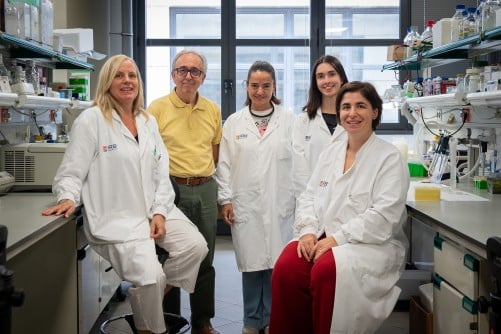A groundbreaking study co-led by Dr. Antonio Zorzano and Dr. Manuela Sánchez-Feutrie at the Institute for Research in Biomedicine (IRB Barcelona) has unveiled a potential new method for tackling obesity without the need to reduce food intake. Published on September 4, 2025, in the journal Nature Communications, the research highlights the role of Neuritin 1, a protein traditionally associated with the nervous system, now identified as a significant player in energy metabolism within brown adipose tissue.
The findings reveal that Neuritin 1 enhances energy expenditure, providing a novel approach to obesity treatment. Unlike existing anti-obesity medications, such as Ozempic and tirzepatide, which primarily work by suppressing appetite, Neuritin 1 increases energy burning without influencing food consumption. “By elevating Neuritin 1 levels specifically in brown fat, we observed that the animals burned more energy, which helped prevent fat accumulation,” said Dr. Zorzano, who also serves as a professor at the University of Barcelona and a researcher at CIBERDEM.
Mechanism of Action and Implications
The research indicates that Neuritin 1 plays a crucial role in mitochondrial activity and the expression of thermogenic genes, which are essential for energy burning. The team utilized a viral vector to induce Neuritin 1 overexpression specifically in thermogenic fat cells, resulting in a significant boost in metabolic activity. Importantly, this increase in metabolism occurred without altering the animals’ food intake or physical activity levels.
“This positions Neuritin 1 as a promising therapeutic candidate for addressing obesity and related disorders such as type 2 diabetes and fatty liver disease,” noted Dr. Sánchez-Feutrie. The metabolic enhancements observed in the study included reduced weight gain, improved insulin sensitivity, and decreased liver inflammation, even among animals subjected to high-calorie diets.
Future Directions and Human Relevance
The implications of this research extend beyond animal models. Genetic data from human subjects indicate a correlation between Neuritin 1 levels and obesity susceptibility, suggesting potential relevance for human health. The research team is currently investigating methods to translate these findings into future therapeutic strategies aimed at obesity treatment.
The study was supported by contributions from various IRB Barcelona core facilities, including Bioinformatics and Biostatistics, Functional Genomics, Protein Expression, and Histopathology. Collaborators from esteemed institutions such as CNRS in France, Karolinska Institutet in Sweden, and the University of Houston in the USA also participated in this research.
While the findings are promising, it is important to note that this research is still in its early stages. Further studies will be necessary before considering potential therapeutic applications in humans.
